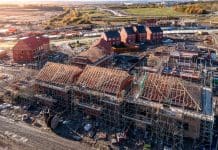Planning approvals were up 27% on 2022 levels, but have declined by 10% in the last three months to August, according to Glenigan
Project starts may be down by 22% against last year, but detailed planning approvals are on the up according to Glenigan’s latest Construction Review.
The September Review focuses on the three months to the end of August 2023, covering all major (>£100m) and underlying (<£100m) projects, with all underlying figures seasonally adjusted.
The construction sector reflects the economic contraction of late, with another interest rise expected this week from the Bank of England.
Main contract awards also faltered on the preceding three months’ performance, declining 37% in the three months to August to stand 27% lower than the same time last year.
Regional performance was poor in the three months to August
Wales had the sharpest increase against the preceding three months, with starts rising by half during the three months to August but remaining 19% down on the year.
Northern Ireland was the only region to experience growth of 80% against the previous year, as well as by almost a quarter (23%) against the preceding three months.
The West Midlands showed a mixed performance with the value of starts increasing 8% against the preceding three months but declining 30% against the previous year.
London and the South West saw the value of project-starts tumble 10% and 15% against the preceding three months, remaining 12% and 42% behind 2022 levels, respectively.
Similarly, Scotland experienced a decrease against both the preceding three months and previous year, with the value of project-starts slipping back 20% and 24%.
Yorkshire & the Humber and the North West both suffered significant falls in project-starts compared to the preceding three months and previous year.
Starts in the South East remained level with the preceding three months but were 24% down on the previous year.
The East Midlands also performed poorly, with the value of project-starts declining by almost a quarter during the three months to August to finish 24% down against the preceding three-month period and 36% lower compared to 2022.
Project-starts in the North East and East of England weakened, slipping back 28% and 14% respectively, to stand 20% and 11% lower than a year ago.
Despite project starts going up, sector verticals painted a poor picture
Social housing project starts’ performance was weak, falling 19% against both the preceding three-month period and previous year.
Residential starts and private housing presented stronger in the three months to August(6% and 14% respectively), but both weakened in comparison to last year.
Retail was the only non-residential sector to post significant growth
Non-residential project-starts declined across the board, with almost all sectors dropping against the preceding three-month period.
Retail was the only exception, bucking the downward trend with a 33% increase on the three months to August. However, starts remained 24% behind the previous year.
Health starts experienced a mixed period, increasing 8% against the preceding three months but remaining 7% below 2022 levels.
Education (-37%) and community & amenity (-37%) starts decreased compared to the preceding three months, leaving them 10% and 51% down on the previous year, respectively.
Civil engineering performance increased 3% against the preceding three months but once again slipped back against the year before, down 29%.
Infrastructure starts drove modest growth against the preceding period, advancing 15%, but remained 33% down on the previous year. Utilities starts declined by 12% against the preceding three months to stand 21% down against the previous year.
Industrial project-starts performance was particularly disappointing, with project-starts suffering a 17% fall during the three months to August to stand 45% lower than a year ago. Offices were similarly affected, with the value of underlying project-starts falling back 25% against the preceding three months, finishing 44% down on last year.
Hotel & leisure also fared poorly, with the value of project-starts weakening 38% against both the preceding three-month period and the previous year.
RAAC remedial work may boost the market in the coming months
Glenigan’s economic director, Allan Willen commented, “Whilst recent editions of the Review have made for sobering reading, an impressive uptick in detailed planning approvals on last year should be welcomed, driven by a rise in a major (£100m plus) projects in the development pipeline since the start of the year including phase 2a of HS2. This highlights the importance of the project to potential future industry workload.
“However, external market pressures continue to dampen overall project-start performance, suggesting it will be some time before a return to market stability and 2021 levels of construction activity.
“Nevertheless, it’s encouraging to see growth in individual sector verticals, with civils starts up 3% and a tentative recovery in residential starts. Furthermore, the industry will likely see an uptick in remedial work over the next few months, as national programmes are introduced to address the widespread RAAC risk across the public and private sector.”














